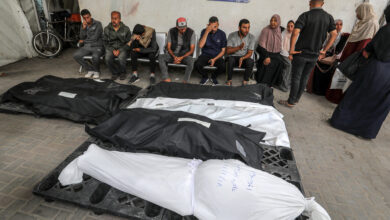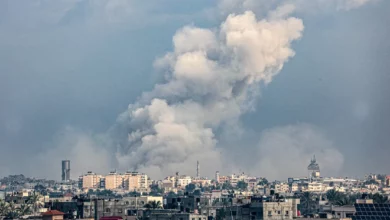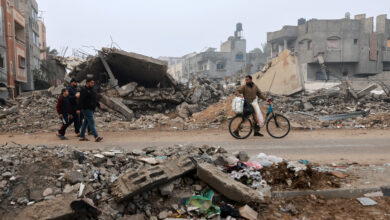When Mahmoud Darwish passed away in August four years ago, three days of mourning were declared in the West Bank and Gaza. The whole Arab world mourned the loss of the man who was the most articulate voice of Palestine for more than four decades. Although most remembered as the poet of national Palestinian resistance who narrated the experience of dispossession and displacement and spoke out against Israeli occupation and injustice, his poetry, which told of the experience of occupation and exile, had a universal appeal that elevated it beyond the immediate political concerns of the Palestinian struggle.
Darwish was born in 1942 in Birweh near the Galilee. In 1948, he fled with his family to Lebanon when his home village was destroyed by the Israeli occupation. A year later, Darwish and his family returned to their home village to find that they had become strangers in their own homeland. Since they had missed the Israeli census, they were denied Israeli citizenship and Darwish was not issued an identity card. The entire family was declared “present absentees,” a situation that Darwish evoked in his poetry to describe the entire Palestinian experience.
His reputation as a poet of national resistance started when he wrote his poem “Identity Card “in the late 1960s. The poem struck a chord with Palestinians in Palestine and in the diaspora. It was a poetic roar of resistance meant to confront Israel’s official attitude of dismissal of Palestinian existence in general:
Write down on the top of the first page:
I do not hate people
Nor do I encroach
But if I become hungry
The usurper's flesh will be my food
Beware …
Beware …
Of my hunger
And my anger!
[Translated from the Arabic by Bashar Barghout]
Edward Said, another deeply missed voice of Palestine and a personal friend of Darwish’s, explained that the rallying cry of the poem: ‘Write down, I’m an Arab,” that reverberated in the Arab world and beyond was addressed to an Israeli policeman during Darwish’s attempt to register at an Israeli office. Yet, regardless of the wide appeal of the poem, Darwish resisted being defined by its nationalistic interpretation, which he saw as an obstacle to his literary and artistic development.
In fact, the strength of Darwish’s poetry lies in its ability to wed the political and the personal in such a way that attains universal resonance. His personal experiences of exile and occupation were translated into languages that at times expressed universal anguish and agony, and at others universal hope and optimism. The imagery and themes of his poetry argued for a Palestinian narrative that resounded beyond this particular moment in history.
While, for example, “State of Siege,” which recorded the 2002 Israeli bombardment of Ramallah during the second Palestinian Intifada was a passionate description of the resistance of the Palestinians to Israeli aggression, it also successfully exhibited parallels to different forms of sieges suffered by individuals who have not experienced the occupation of Palestine. The siege referred to a condition where every aspect of our lives is subject to scrutiny and inhibition whether real or imagined, literal or metaphorical.
It is not only Palestine that is evoked in Darwish’s poetry, but the entire experience of exile as a human condition of the soul and a major theme in literature. Even in his writings about love, Darwish was capable of summoning exile to enrich his poetry. This could be most enjoyed in his poem “She’s Alone in the Evening.” In the poem, Darwish conjured the image of a couple who are seated at close proximity but who engage in an imagined flirtation that exists only in the mind of each.
It is night and she is lonely
and I am lonely like her,
between her candle and mine are two empty tables
in this winter restaurant.
Nothing disturbs the silence between us
She doesn't see me when I catch her plucking a rose
from her breast and I don't see her when she catches me
sipping a kiss from my wine…
She doesn't crumble her bread and I don't spill water
on the paper tablecloth.
Nothing disturbs the serenity between us
[Translated from the Arabic by Omnia Amin and Rick London]
The longing and yearning, as well as the distance between the subject and the desired, that are all major features of the exilic experience provide the backdrop of the poem. And Just like Darwish, who lived for years in exile in Paris without speaking a word of French, the imagined couple in the poem communicate silently and harmoniously. Exile is also occasionally capable of nourishing the soul, Darwish reminded us.
Palestinian literature has long faced the challenge of being read only within the confines of the Palestinian struggle. Darwish however excelled in overcoming this challenge through his work that incessantly connected the particular to the universal, the political to the human.
In his poem In Praise of the High Shadow, Darwish elevated the human and downplayed the national. He believed in the need for poetry to depict the human and the humanitarian. Addressing a Palestinian fighter, the poet wrote:
You, you are the question.
What do you want?
As you march from a legend, to a legend?
A flag?
What good have flags ever done?
Have they ever protected a city from the shrapnel of a bomb?
What do you want?
A newspaper?
Would the papers ever hatch a bird, or weave a grain?
What do you want?
Police?
Do the police know where the small earth will get impregnated from the
coming winds?
What do you want?
Sovereignty over ashes?
While you are the master of our soul; the master of our ever-changing
existence?
So leave,
For the place is not yours, nor are the garbage thrones.What do you want?
[Translated from the Arabic by Saifedean Ammous]
Darwish knew that a belief in nationalism that is void of empathy and humanity provides no end to the conflict. He worked towards Palestinian art that is not defined by the relationship with Israel. He wrote about love and death, memory and forgetting, the passage of time and the distance between lovers, grief and joy. And, while these themes might start in Palestine, through his intimate style of poetry, they broke through the particularities of the political situation and travelled comfortably beyond the historical moment and the political question.
Assmaa Naguib holds a doctoral degree in literature. She is interested in the literature of exile and migration in relation to nationalism.




